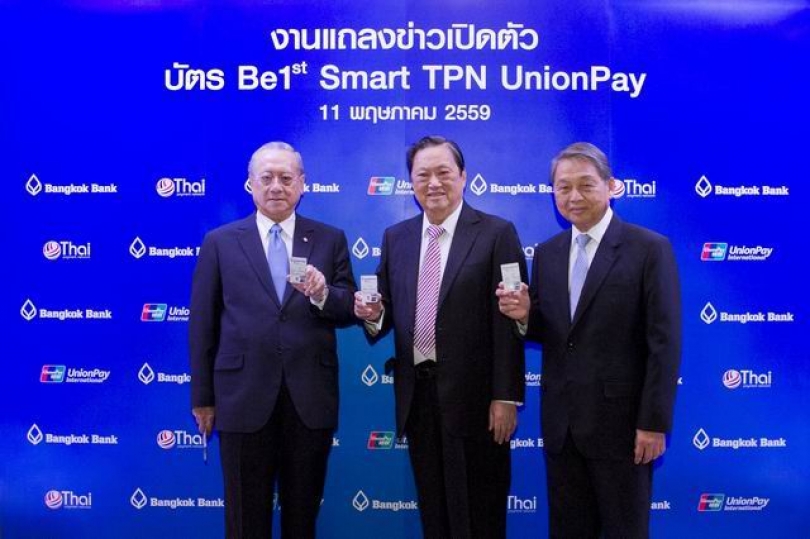BBL’s Be1st blazes trail for chip-based debit cards

BANGKOK BANK will make its Be1st Smart TPN UnionPay card the main debit card it issues to new customers and will promote the card’s quick acceptance by merchants by offering a 0.75-per-cent merchant fee, compared with the 1.5-2.5 per cent normally charged
BBL is the first Thai bank to issue a microchip-based debit card under the new standard set by the Thai Payment Network (TPN), to replace less secure magnetic-stripe cards.
From May 16, all banks will issue chip-based debit cards to new customers. People who now use magnetic-stripe cards can contact their banks to change to the new system without paying the normal card-replacement fee of Bt100.
Thaweelarp Rittapirom, director and executive vice president of BBL, said that from next Monday, the bank would give priority to the Be1st Smart TPN UnionPay card instead of the Bt1st Visa debit card to both new and existing customers who want to use a chip-based card.
The benefit of domestically issued TPN debit cards is a 0.75-per-cent merchant fee, encouraging small merchants to accept debit cards. Holders of TPN debit cards will be required to use a six-digit personal identification number (PIN) when they make a payment.
The Be1st Smart TPN UnionPay will be BBL’s prototype card under the new system. After that, the bank will apply the TPN standard to the Be1st Smart Rabbit Siriraj and Be1st Smart Rabbit cards.
The annual fee for BBL’s debit cards is usually Bt300, but the bank has reduced it to Bt200 until June 30 to encourage people to use debit cards. Thaweelarp said it might keep the annual fee of Bt200 for the Be1st Smart TPN UnionPay card. Each year, BBL issues around 2 million debits card, and from now on most will be Be1st Smart TPN UnionPay cards.
The bank has a total of 16 million debit cards in circulation, of which 6 million are microchip-based. BBL became the first Thai bank to launch chip cards in May 2009, but they can only make cash withdrawals from Bangkok Bank’s own automated teller machines because no other banks in Thailand have launched chip cards.
Thaweelarp said the bank’s customers would be able to withdraw money from other banks’ ATMs from Monday onwards after all banks implement a chip-card standard and their ATMs have been adjusted to accommodate all microchip-based debit cards.
He said debit cards had not been widely used until now because of the unattractive merchant fees. However, after the merchant fee is reduced to 0.75 per cent, such transactions should gradually increase.
Shoke na Ranong, chairman of TPN, said merchants at present had to pay fees of 1.5-2.5 per cent because debit-card transactions had to be processed internationally until now.
Holders of TPN debit cards must spend at least Bt30 per transaction, and if the transaction is over Bt300, they will receive a text alert from their bank, he said.
The technology for the TPN system is provided by China UnionPay International (UPI), a global payment network with the largest cardholder base in the world.
Ready to talk to Visa, MasterCard
TPN is ready to talk with Visa or MasterCard on whether they want to join the Thai Payment Network. TPN is also open to non-banks and telecom companies to be members and issue their own chip-based debit cards.
TPN is a joint venture between UPI and a group of Thai commercial banks, with BBL as a primary shareholder. Kasikornbank, Krungthai Bank and Siam Commercial Bank have signed agreements expressing their interest in holding TPN shares.
RELATED





